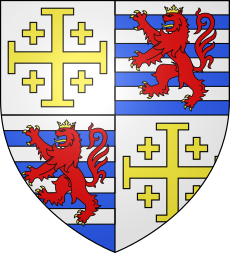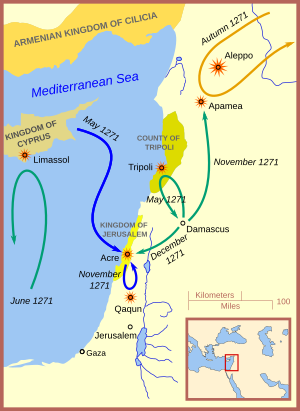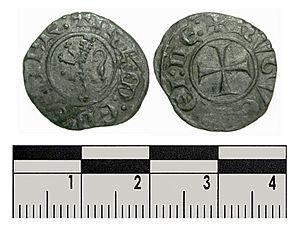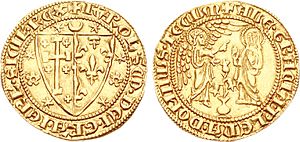Hugh III of Cyprus facts for kids
Quick facts for kids Hugh III |
|
|---|---|
| King of Jerusalem | |
| Reign | 1268–1284 |
| Predecessor | Conrad III |
| Successor | John II |
| Rival | Charles I (1277–1284) |
| King of Cyprus | |
| Reign | 1267–1284 |
| Predecessor | Hugh II |
| Successor | John I |
| Born | c. 1235 |
| Died | 24 March 1284 (aged 48–49) Tyre, Lordship of Tyre |
| Spouse | Isabella of Ibelin |
| Issue more... |
|
| House | Poitiers-Antioch |
| Father | Henry of Antioch |
| Mother | Isabella of Cyprus |
Hugh III (born around 1235 – died March 24, 1284) was a powerful ruler in the Middle Ages. He was known as Hugh of Antioch-Lusignan and sometimes called the Great. He became king of Cyprus in 1267 and king of Jerusalem in 1268.
Hugh came from the important family of the princes of Antioch. Before becoming king, he served as a regent, which means he ruled for young kings who were too young to govern themselves. He was regent for Hugh II of Cyprus and Conrad III of Jerusalem.
When these young kings died, Hugh took their thrones. He seemed like a strong leader who could make a real difference. He was the first king of Jerusalem to live in the kingdom for many years. Hugh worked hard to make the king's power stronger and to protect the land from the Egyptian Mamluks.
He made important alliances by marrying into powerful noble families like the Ibelins and the Montforts. However, his efforts to unite the mainland were difficult. Some groups, like the Venetian merchants and the Knights Templar, did not support him. Also, his own nobles in Cyprus did not always want to send their armies to fight for Jerusalem.
Hugh's right to be king of Jerusalem was challenged by his aunt, Maria of Antioch. She sold her claim to Charles I of Anjou, a powerful European ruler. With support from Venice and the Templars, Charles took Acre, which was the last city directly controlled by the king on the mainland. Hugh tried twice to get Acre back but failed. He died in Tyre in 1284 and was succeeded by his son, John I.
Contents
Early Life and Family Connections
Hugh's mother was Isabella of Cyprus, and his father was Henry of Antioch. They married around 1233. Isabella was the sister of King Henry I of Cyprus. Hugh's father was the youngest son of Prince Bohemond IV of Antioch.
Hugh's grandmother, Alice of Champagne, had also tried to claim the throne of Jerusalem. She ruled the kingdom as a regent from 1243. After she died in 1246, the regency passed to her son, Henry I of Cyprus, who ruled until 1253.
Hugh grew up with his cousin, Hugh of Brienne. His mother, Isabella, raised them both. Hugh married Isabella, who came from the powerful House of Ibelin. The Ibelins were a leading noble family in the Kingdom of Jerusalem. Their marriage, or at least their engagement, happened in 1255. People described Hugh as handsome and charming, but he sometimes had a bad temper.
Serving as Regent
| Hugh's relationship to the rulers of Cyprus, Jerusalem, and Antioch | |||||||||||||||||||||||||||||||||||||||||||||||||||||||||||||||||||||||||||||||||||||||||||||||||||||||||||||||||||||||||||||||||||||||||||||||||||||||||||||||||||||||||||||||||||||||||||||||||||||||||||||||||||||||||||||||||||||||||||||||||||||||||||||||||||||||||||||||||||||||||||||||||||||||||||||||||||||||||||||||||||||||||||||||||||||||||||||||||||||||||||||||||||||||||||||||||||||||||||||||||||||||||||||||||||||||||||||||||||||||||||||||||||||||||||||||||||||||||||||||||||||||||||||||||||||||||||||||||||||||||||||||||||||||||||||||||||||||||||||||||||||||||||||||||||||||||||||||||||||||||||||||||||||||||||||||||||||||||||||||||||||||||||||||
|---|---|---|---|---|---|---|---|---|---|---|---|---|---|---|---|---|---|---|---|---|---|---|---|---|---|---|---|---|---|---|---|---|---|---|---|---|---|---|---|---|---|---|---|---|---|---|---|---|---|---|---|---|---|---|---|---|---|---|---|---|---|---|---|---|---|---|---|---|---|---|---|---|---|---|---|---|---|---|---|---|---|---|---|---|---|---|---|---|---|---|---|---|---|---|---|---|---|---|---|---|---|---|---|---|---|---|---|---|---|---|---|---|---|---|---|---|---|---|---|---|---|---|---|---|---|---|---|---|---|---|---|---|---|---|---|---|---|---|---|---|---|---|---|---|---|---|---|---|---|---|---|---|---|---|---|---|---|---|---|---|---|---|---|---|---|---|---|---|---|---|---|---|---|---|---|---|---|---|---|---|---|---|---|---|---|---|---|---|---|---|---|---|---|---|---|---|---|---|---|---|---|---|---|---|---|---|---|---|---|---|---|---|---|---|---|---|---|---|---|---|---|---|---|---|---|---|---|---|---|---|---|---|---|---|---|---|---|---|---|---|---|---|---|---|---|---|---|---|---|---|---|---|---|---|---|---|---|---|---|---|---|---|---|---|---|---|---|---|---|---|---|---|---|---|---|---|---|---|---|---|---|---|---|---|---|---|---|---|---|---|---|---|---|---|---|---|---|---|---|---|---|---|---|---|---|---|---|---|---|---|---|---|---|---|---|---|---|---|---|---|---|---|---|---|---|---|---|---|---|---|---|---|---|---|---|---|---|---|---|---|---|---|---|---|---|---|---|---|---|---|---|---|---|---|---|---|---|---|---|---|---|---|---|---|---|---|---|---|---|---|---|---|---|---|---|---|---|---|---|---|---|---|---|---|---|---|---|---|---|---|---|---|---|---|---|---|---|---|---|---|---|---|---|---|---|---|---|---|---|---|---|---|---|---|---|---|---|---|---|---|---|---|---|---|---|---|---|---|---|---|---|---|---|---|---|---|---|---|---|---|---|---|---|---|---|---|---|---|---|---|---|---|---|---|---|---|---|---|---|---|---|---|---|---|---|---|---|---|---|---|---|---|---|---|---|---|---|---|---|---|---|---|---|---|---|---|---|---|---|---|---|---|---|---|---|---|---|---|---|---|---|---|---|---|---|---|---|---|---|---|---|---|---|---|---|---|---|---|---|---|---|---|---|---|---|---|---|---|---|---|---|---|---|---|---|---|---|---|---|---|---|---|---|---|---|---|---|---|---|---|---|---|---|---|---|---|---|---|---|---|---|---|---|---|---|---|---|---|---|---|---|---|---|---|---|---|---|---|---|---|---|---|---|---|---|---|---|---|---|---|---|---|---|---|---|---|---|---|---|---|---|---|---|---|---|---|---|---|---|---|---|---|---|---|---|---|---|---|---|---|---|---|---|---|---|---|---|---|---|---|---|---|---|---|---|---|---|---|---|---|---|---|---|---|---|---|---|---|---|---|---|---|---|---|---|
|
|||||||||||||||||||||||||||||||||||||||||||||||||||||||||||||||||||||||||||||||||||||||||||||||||||||||||||||||||||||||||||||||||||||||||||||||||||||||||||||||||||||||||||||||||||||||||||||||||||||||||||||||||||||||||||||||||||||||||||||||||||||||||||||||||||||||||||||||||||||||||||||||||||||||||||||||||||||||||||||||||||||||||||||||||||||||||||||||||||||||||||||||||||||||||||||||||||||||||||||||||||||||||||||||||||||||||||||||||||||||||||||||||||||||||||||||||||||||||||||||||||||||||||||||||||||||||||||||||||||||||||||||||||||||||||||||||||||||||||||||||||||||||||||||||||||||||||||||||||||||||||||||||||||||||||||||||||||||||||||||||||||||||||||||
Hugh's mother, Isabella, was the aunt of the young King Hugh II of Cyprus. This made her the closest royal relative. The king's mother, Plaisance of Antioch, ruled as regent until she died in 1261. Isabella was next in line to be regent.
However, Isabella gave the regency to her son, Hugh of Antioch. He proved to be a very capable ruler. Hugh II was also the heir to King Conrad III of Jerusalem, who lived in Europe. This meant Hugh II was supposed to govern Jerusalem as regent. But since he was a child, his closest relative, Isabella, took on that role in 1263.
Isabella died in 1264. A disagreement then started between Hugh of Brienne and Hugh of Antioch. Hugh of Brienne argued that he should be regent in Jerusalem because his mother was older than Hugh of Antioch's mother.
But Hugh of Antioch, as regent of Cyprus, could offer more military help to the struggling Kingdom of Jerusalem. He also had better connections, being a cousin of Prince Bohemond VI of Antioch and married into the powerful Ibelin family. The High Court of Jerusalem decided that since both were equally close relatives, the older one should rule. This was Hugh of Antioch. Being chosen as regent meant Hugh of Antioch was likely to become the next king after Hugh II.
As regent, Hugh felt it was his duty to protect the Crusader states. He was the first ruler of Cyprus in over ten years to send a Cypriot army to defend Jerusalem. However, his army arrived too late. The Mamluk ruler of Egypt, Baibars, had already conquered several important cities. Hugh likely focused on strengthening the defenses of Acre, which was the only royal city left on the mainland.
Becoming King
King Hugh II died in December 1267 at the age of 14. He had not yet reached adulthood. His cousin and regent, Hugh of Antioch, became the new king of Cyprus (as Hugh III). Hugh III was crowned in Nicosia on December 25, 1267.
In May 1268, the new king sailed to Acre. He wanted to be officially recognized as the regent and heir to Conrad III of Jerusalem. The High Court was ready to accept him. However, his aunt, Maria of Antioch, challenged his claim. She argued that she was a closer relative to Conrad. Hugh was a great-grandchild of their shared ancestor, Queen Isabella I of Jerusalem, but Maria was a grandchild.
Maria's legal argument was stronger. But Hugh was a man, experienced in government, and had troops. In 1268, Baibars had conquered more cities, which made the High Court choose Hugh.
On October 29, 1268, Conrad was executed in Naples. This happened because Charles I of Anjou had conquered Conrad's kingdom. Hugh then also became king of Jerusalem. Instead of appointing someone else to rule for him, Hugh split his time between Cyprus and Acre. For the first time in many years, the mainland kingdom had a king living there.
Hugh's Policies and Challenges
The nobles in the Kingdom of Jerusalem had become very independent. Hugh tried to improve the government. He created an inner council and used a special royal seal, likely ideas from Cyprus. Previous regents had given away much of the royal land. These grants were not fully legal and became invalid when Hugh became king.
Hugh refused to accept these land grants as final. But he was willing to find solutions. He focused on building strong relationships with the Montforts. This was a powerful family that controlled the important city of Tyre. Hugh made an agreement with Philip of Montfort. Hugh's sister, Margaret, would marry Philip's son, John. Philip would give Tyre to John. Hugh would then officially grant Tyre to John and his children with Margaret.
This agreement allowed Hugh to be crowned king. Despite Maria's protests, he was crowned on September 24, 1269. The ceremony took place in the Crusader Cathedral of Tyre. Kings and queens of Jerusalem had been crowned there since the city of Jerusalem was lost in 1187.
In June 1271, Acre was in danger when Baibars conquered a nearby castle. Baibars then tried to attack Cyprus but failed. Around this time, the English prince Edward arrived in Acre with a small army for a crusade.
Edward was disappointed by the local Christians. The Cypriot knights were worried after Baibars' attack on their island. They refused to fight for Hugh on the mainland. They argued that the king could not make them fight outside Cyprus. Edward was asked to help settle this dispute. Their refusal was embarrassing for Hugh. It was decided that knights could be ordered to serve abroad for four months each year, but only if led by the king or his son.
Edward helped Hugh raid Baibars' territory. In early 1272, Hugh secured a truce, which kept Acre peaceful until 1291. Edward left on June 16, 1272.
The only other important noble land on the mainland was Beirut. It was held by Isabella of Ibelin. Her husband, Hamo le Strange, did not trust King Hugh. On his deathbed in 1273, he placed Isabella and Beirut under Baibars' protection. As a female noble, Isabella was legally required to marry one of three men chosen by the king. Hugh wanted to offer her hand in marriage to attract a skilled knight to the East. He took Isabella to Cyprus. Baibars demanded she be returned to Beirut. Hugh eventually agreed. The king did not regain control over Beirut until after Baibars died. Despite some successes, Hugh found it hard to be more than "king of Acre," as Muslim writers called him.
In 1275, Bohemond VI, the last prince of Antioch, died. He left two children, Bohemond VII and Lucia. Bohemond VII inherited the County of Tripoli but was a minor. King Hugh went to Tripoli to claim regency, as he was the closest adult relative. However, Bohemond VII's mother, Sibylla of Armenia, had already become regent, which was her right. Hugh found no support in Tripoli. He only achieved a small diplomatic victory by negotiating a truce with Baibars for Latakia. This preserved the last part of the Principality of Antioch.
Challenges from Nobles and Charles of Anjou
Hugh managed to fix problems between his nobles, the Ibelins and the Montforts. But the merchants of Venice and Genoa remained hostile. The Venetians were especially upset because Hugh favored the Genoese. The Templars and the Teutonic Knights did not like his friendship with Philip of Montfort. The people of Acre also disliked the king's renewed involvement in their city and his favoritism towards Tyre.
Although he disliked Hugh, the grand master of the Templars, Thomas Berard, never openly challenged him. But William of Beaujeu, who became grand master in 1273, was determined to weaken the king's power.
Hugh's biggest problem was his aunt Maria, who kept claiming the throne of Jerusalem. Hugh sent representatives to answer her appeal to the Holy See in 1273. But she was already planning to sell her claim to Charles of Anjou. Hugh had feared Charles's ambition to control the Mediterranean since 1269. Charles had the support of William of Beaujeu, who was his relative. As ruler of Sicily and brother of the famous crusader King Louis IX of France, Charles offered more military and diplomatic power than Hugh. Charles was also personally against Hugh, encouraging Maria's claims to Jerusalem and Hugh of Brienne's claims to Cyprus.
Hugh was so angry about the opposition he faced that he suddenly left Acre for good in October 1276. The final straw was when the Templars bought a village near Acre. They purposely did not ask for the king's approval and ignored his complaints. The Templars and Venetians were happy to see him go. But the Hospitallers, Teutonic Knights, and the Latin patriarch of Jerusalem, Thomas of Lentino, were shocked. They sent people to Tyre, where Hugh had gone, planning to sail to Cyprus. They begged him to at least appoint someone to rule for him. It took his brother-in-law, John of Montfort, to convince the angry king to appoint an administrator, Balian of Ibelin. King Hugh immediately sailed to Cyprus. From there, he explained his actions to Pope John XXI.
Maria's claim was sold to Charles, with the Pope's approval, in March 1277. Within weeks, Charles's representative, Roger of San Severino, arrived in Acre to take control. Hugh offered no resistance. Roger declared Charles king of Jerusalem. He demanded that the nobles pledge loyalty to him as Charles's representative. To keep things legal, the nobles twice asked Hugh to release them from their loyalty to him. But he refused to answer. The rulers of the most important lands, John of Tyre and Isabella of Beirut, continued to recognize Hugh as their rightful king.
Fighting for Acre
Hugh tried twice to take Acre back, but he was not successful. In 1279, he brought a large Cypriot army to Tyre. He hoped that showing his strength and offering money would be enough to regain control of the city. John of Montfort was on his side. But William of Beaujeu's continued opposition to Hugh ruined the plan. When Hugh returned to Cyprus, he seized the Templars' properties and destroyed their forts as punishment. The Templars complained to the Pope, who asked Hugh to return their property, but Hugh refused. Although his ability to support the mainland against the Mamluks was limited after 1277, Hugh may have planned to help the Mongols in their attempt to invade the Mamluk-held lands.
In 1282, Roger of San Severino was called back because of a major uprising in Sicily against Charles. Also, Isabella of Beirut died, and her land passed to her sister, Eschiva. Eschiva's husband, Humphrey of Montfort, was a close friend of Hugh's. Encouraged by this, Hugh decided to try again to retake Acre. He sailed from Cyprus in late July 1283 with his sons Henry and Bohemond.
Instead of landing at Acre, Hugh's ship was blown to Beirut. He was welcomed there on August 1. As his army marched to Tyre, they were attacked by Muslim raiders. The king believed the Templars had encouraged these attacks. Hugh reached Tyre by sea. He encountered some bad signs: his flag fell into the sea, and the cross carried by the priests accidentally hit and cracked the skull of his Jewish doctor. Hugh waited in vain to be welcomed into Acre. Charles's new representative in Acre, Odo Poilechien, had just made a truce with the Mamluks. Hugh may have feared their involvement if he attacked.
The king lost his promising son, Bohemond, on November 3, 1283. An even harder blow was the death of his friend and brother-in-law, John of Montfort. The Cypriot soldiers left him after their agreed four months of service ended. But Hugh stayed in Tyre, where he died on March 24, 1284. His eldest surviving son, John I, became king. John I died the next year, and another son, Henry II, became king.
Children of Hugh III
Hugh and his wife, Isabella of Ibelin, had eleven children:
- John I (died 1285), who became king after Hugh III
- Bohemond (died 1283)
- Henry II (died 1324), who became king after John I
- Amalric (died 1310), who later took power from Henry II
- Aimery (died 1316), who briefly ruled after Amalric
- Guy, whose son, Hugh IV, became king after Henry II
- Maria (died 1322), who married King James II of Aragon
- Margaret (died 1296), who married King Thoros III of Armenia
- Alice, who married Balian of Ibelin, a noble from Bethlehem
- Helvis
- Isabella (died 1319)
Sources
| Regnal titles | ||
|---|---|---|
| Preceded by Hugh II |
King of Cyprus 1267–1284 |
Succeeded by John I/II |
| Preceded by Conrad III |
King of Jerusalem 1268–1284 |
|
 | James Van Der Zee |
 | Alma Thomas |
 | Ellis Wilson |
 | Margaret Taylor-Burroughs |





